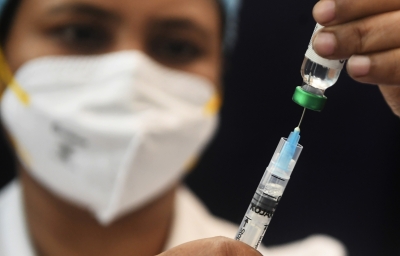New Delhi : , Nov 22, 2018 – The devastating pandemic effects have been mitigated by the Covid-19 vaccine.In January 2021, the government began a mass vaccination campaign.
More than 110 million Indians had received at least one dose as of November 20, 2021.Multiple roadblocks stand in the way of India becoming 100 percent vaccinated.
The most significant are vaccine resistance and vaccine hesitancy.Resistance refers to a complete rejection of the vaccine.
Vaccine Hesitancy is a delay in accepting a vaccine. The Daily Wage Worker Platform, Jindal Global University and The Daily Wage Worker Platform (DWWP), conducted a survey in order to determine the levels and characteristics of vaccine resistance among the hesitant populations.
The two organizations have announced the publication of the report that analyzes the main findings.JGU India’s leading private university boasts a wide range of academics and researchers from India and around the world.
Sriram Raghavan is the Joint Director of Jindal Global University.He stated, “We are delighted to have partnered with DWWP in order to create a knowledge platform that supports migrant workers and those earning daily wages in India.” Our students have had a rewarding experience through the voluntary partnership with the NGO.They were able to witness the everyday struggles of migrants.The students gained valuable field and academic exposure while working on this report, which reveals a critical view of India’s informal sector workers (450 million) on India’s vaccine drive.
Daily Wage Worker Platform is an NGO that supports migrants during the current pandemic.
It provides support for daily wage workers, food security and healthcare.DWWP partnered the Smile Foundation and the Swiss government to provide an emergency package of health care for workers living in slums.
This included Tele-medicine, social distancing and social distancing.DWWP established a virtual help desk in order to keep you informed about the availability of medical supplies for the second wave.
Our vaccine survey report gives a detailed field assessment of urban migration’s reach and provides insights into factors that cause resistance or hesitancy in workers.Siddhartha Prakash (Founder of Daily Wage Worker Platform) said that the recommendations and findings will be incorporated in the development of vaccination programs and communications nationals to combat vaccine resistance worldwide.
Researchers from JGU conducted the dipstick survey in six cities: Delhi, Gurgaon Mumbai, Ranchi Mumbai, Ranchi and Chennai.The initial hypothesis of the cause and consequences of vaccine resistance/hesitancy was made by secondary research.
This survey was designed carefully to assess various psycho-social and demographic aspects.The convenience sampling method was used to survey 200 daily wage workers and migrants.
This report analyzes their responses, and offers suggestions to key stakeholders such as the government and NGOs.The results of the vaccination survey showed that 44% of 200 immigrants surveyed in six cities received the first dose of vaccine, while 18% received the second.38 percent had never been vaccinated and 18% were reluctant.12 percent refused the vaccine.
This survey measured resistance and hesitancy towards vaccines against various parameters, including gender and occupation.Income was the most prominent, displaying an inverted relationship between income and resistance to vaccination.
People who earn less than Rs 10,000 per day were the most resistant to getting vaccinated.However, those with fixed incomes were more willing to be vaccinated.
Numerous employers in the public and private sectors are encouraging vaccinations.This includes railway and construction companies that have mandated their employees to get vaccinated.
Many workers are still skeptical, ignorant and resistant to Covid-19.The survey not only assessed hesitancy among different groups but also attempted to identify the root causes of hesitancy.
Fear of side effects and loss of income, as well as distrust of the public health system, lack of access and information about the vaccine program, were some of the reasons.Channels of communication were a major influence on hesitancy.
Respondents who got most of their information through community leaders and panchayats reported greater resistance to the vaccine.
Based on survey results, the recommendations section offers practical ways to decrease vaccine hesitancy.The government should provide more information and build trust between communities to make vaccines easier access.NGO’s can help mobilize communities and dispel vaccine myths.They also facilitate access to Aarogya Setu Apps and vaccination centres.Employers have a role to play in encouraging workers to get vaccinated.
san/sks/dpb #Daily #Wage #Worker #Platm #Jindal #publish #Delhi #Mumbai #Chennai #Tamil #Kollywood
.






